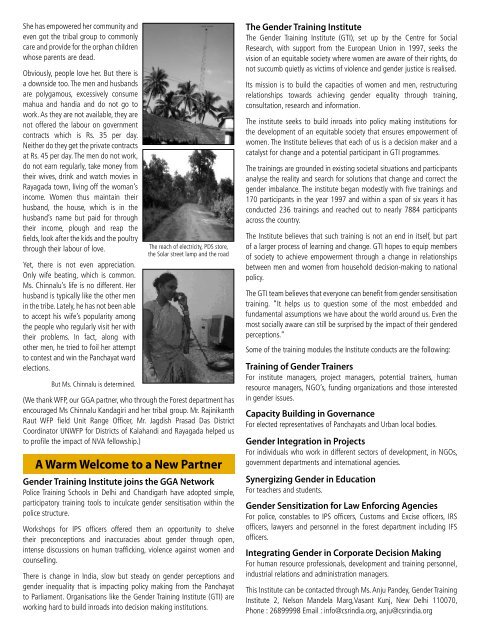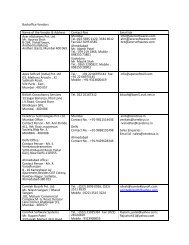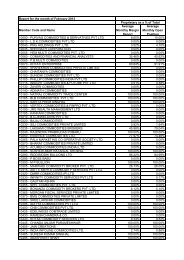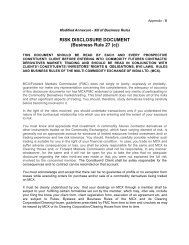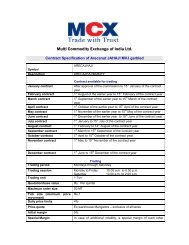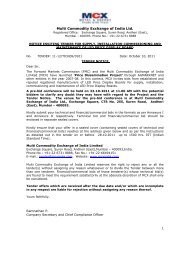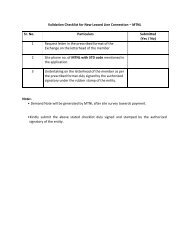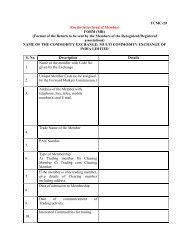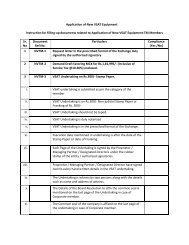The Power of OneTribal Woman Armed With NVAFellowship Takes On OfficialsThis is the story of Ms. Chinnalu Kandagiri, a 43 year old, uneducatedtribal woman from the mountainous Rayagada district of Orissa whosestruggles have secured an identity for her people, a road to her villagewith solar street lamps, schools for the children and power supply.Her people, 54 families belonging to the Dongria Kondha tribe, aretraditionally fruit farmers or horticulturists and practised shiftingcultivation also called slash and burn cultivation or Podu on the hills,which made them nomadic. Moving from one place to another, theywould set up makeshift shelters and had no regular system of educationfor their children or health facilities. Until Ms. Chinnalu stepped in andassumed leadership.This small diminutive woman, wearing a sari and a gentle smile doesnot look like the stuff leaders are made of, until one notes the intensedetermination in her eyes which brook no obstacle to her progress.Educated up to class three, through adult literacy programs, she hasdeterminedly learnt two languages, Oriya and Telegu, to serve herinterests. The tribe speaks a distinctive language, ‘Kui,’ which has nowritten script.With Oriya, she succeeded in breaking the language barrier between hertribe and the neighbouring villagers. Through her contacts with otherwomen, she changed attitudes and generated the good will that allowedher tribe to set up and settle down in the village of Gunupur in Rayagadadistrict. This way, she succeeded in anchoring her complete group of 54families from a nomadic to a settled lifestyle.Rayagada is a district of Orissa, which has 16 per cent of land underthe reserved forest area. There are about 62 tribes in Orissa ofwhich the most ancient group are the Kondhas (they are one of thedeclared 13 primitive tribes of India) who inhabit the plateaus of theNiyamgiri hill ranges which encircle the areas of Rayagada, Koraputand Kalahandi districts.“As a child, I never had the opportunity to go to school. I wanted to learnand I wanted every child to be educated. This was only possible if wecould stay on and work in one place,” she says.Once settled, for a livelihood, she and her group of women began tocultivate paddy in leased farms in the neighbouring villages. But the annualshare of the yield was not sufficient to meet basic needs throughout theyear, and therefore, their families needed to work on daily wages.Her struggle to make ends meet made her tap her group’s latent talentas horticulturists. She went to the Forest Department who had land thatneeded to be developed into a nursery. She motivated her group of threeactive Women’s self help groups (SHG) in the village to work in thenursery. In the first year itself, they earned a profit of about Rs. 69,000,by developing a teak and herbals nursery. Under her dynamic leadership,three women SHGs were formed into a federation. Ms. Chinnalu is thespokesperson of this team and represents the problems of the federationand her village to demand justice and action for a better life.The Jamsetji Tata National Virtual Academy (NVA) recognised herleadership and honoured her commitment with a NVA Fellowship of thegrassroot academicians in August 2006.Armed with a Fellowship, and increased confidence, Ms Chinnalusucceeded in anchoring more than five tribal groups similar to hers, intothe neighbouring areas within a radius of 50 to 60 kilometres. This hasbrought her appreciation and fame, which she has used positively for thebetterment of her cluster of villages.“Wearing the convocation scarf while meeting the government officialshelps me to make them take my words seriously,” she says.She has managed to obtain a grant of Rs. 50,000 from the stategovernment to maintain a community centric poultry in her village.With the help of SHGs she has managed to raise kitchen gardens neartheir homes. She has also motivated more women to work in the SHGs,taking the number from 12 women to 50 women, which has led to anincrease in profits close to Rs. 1,50,000, that was deposited with thelocal cooperative bank. This has led to an increase in the income of thesewomen thereby allowing them the luxury of finding more time for theirchildren rather than taking up extra labour jobs.Much wants more. Ms Chinnalu then started canvassing for what shebelieved was their right. She started a struggle for a tarred approachroad to her village. Although, this is yet to be done, her village has beenproperly defined. This means, it would now be eligible for basic facilities.Ms Chinnalu has also successfully got the support of the local governmentofficials for getting a balwadi and then an aanganwadi school constructednear her habitation, which provides midday meals and a primary educationfor the tribal children in the area. Today there are about five children fromher village going to the secondary school in Rayagada.As her village achieved a name, doctors from the government hospitalstarted to visit regularly providing some modicum of health consultancyto he people.A public distribution system outlet has yet to reach her village. But shehas managed to get a storehouse constructed for stocking their share ofthe oil and food grains from the neighbouring PDS centre.She has convinced government officers to provide a solar street lamp toher village and make electricity reach the common points of the village.
She has empowered her community andeven got the tribal group to commonlycare and provide for the orphan childrenwhose parents are dead.Obviously, people love her. But there isa downside too. The men and husbandsare polygamous, excessively consumemahua and handia and do not go towork. As they are not available, they arenot offered the labour on governmentcontracts which is Rs. 35 per day.Neither do they get the private contractsat Rs. 45 per day. The men do not work,do not earn regularly, take money fromtheir wives, drink and watch movies inRayagada town, living off the woman’sincome. Women thus maintain theirhusband, the house, which is in thehusband’s name but paid for throughtheir income, plough and reap thefields, look after the kids and the poultrythrough their labour of love.Yet, there is not even appreciation.Only wife beating, which is common.Ms. Chinnalu’s life is no different. Herhusband is typically like the other menin the tribe. Lately, he has not been ableto accept his wife’s popularity amongthe people who regularly visit her withtheir problems. In fact, along withother men, he tried to foil her attemptto contest and win the Panchayat wardelections.But Ms. Chinnalu is determined.The reach of electricity, PDS store,the Solar street lamp and the road(We thank WFP, our GGA partner, who through the Forest department hasencouraged Ms Chinnalu Kandagiri and her tribal group. Mr. RajinikanthRaut WFP field Unit Range Officer, Mr. Jagdish Prasad Das DistrictCoordinator UNWFP for Districts of Kalahandi and Rayagada helped usto profile the impact of NVA fellowship.)A Warm Welcome to a New PartnerGender Training Institute joins the GGA NetworkPolice Training Schools in Delhi and Chandigarh have adopted simple,participatory training tools to inculcate gender sensitisation within thepolice structure.Workshops for IPS officers offered them an opportunity to shelvetheir preconceptions and inaccuracies about gender through open,intense discussions on human trafficking, violence against women andcounselling.There is change in India, slow but steady on gender perceptions andgender inequality that is impacting policy making from the Panchayatto Parliament. Organisations like the Gender Training Institute (GTI) areworking hard to build inroads into decision making institutions.The Gender Training InstituteThe Gender Training Institute (GTI), set up by the Centre for SocialResearch, with support from the European Union in 1997, seeks thevision of an equitable society where women are aware of their rights, donot succumb quietly as victims of violence and gender justice is realised.Its mission is to build the capacities of women and men, restructuringrelationships towards achieving gender equality through training,consultation, research and information.The institute seeks to build inroads into policy making institutions forthe development of an equitable society that ensures empowerment ofwomen. The Institute believes that each of us is a decision maker and acatalyst for change and a potential participant in GTI programmes.The trainings are grounded in existing societal situations and participantsanalyse the reality and search for solutions that change and correct thegender imbalance. The institute began modestly with five trainings and170 participants in the year 1997 and within a span of six years it hasconducted 236 trainings and reached out to nearly 7884 participantsacross the country.The Institute believes that such training is not an end in itself, but partof a larger process of learning and change. GTI hopes to equip membersof society to achieve empowerment through a change in relationshipsbetween men and women from household decision-making to nationalpolicy.The GTI team believes that everyone can benefit from gender sensitisationtraining. “It helps us to question some of the most embedded andfundamental assumptions we have about the world around us. Even themost socially aware can still be surprised by the impact of their genderedperceptions.”Some of the training modules the Institute conducts are the following:Training of Gender TrainersFor institute managers, project managers, potential trainers, humanresource managers, NGO’s, funding organizations and those interestedin gender issues.Capacity Building in GovernanceFor elected representatives of Panchayats and Urban local bodies.Gender Integration in ProjectsFor individuals who work in different sectors of development, in NGOs,government departments and international agencies.Synergizing Gender in EducationFor teachers and students.Gender Sensitization for Law Enforcing AgenciesFor police, constables to IPS officers, Customs and Excise officers, IRSofficers, lawyers and personnel in the forest department including IFSofficers.Integrating Gender in Corporate Decision MakingFor human resource professionals, development and training personnel,industrial relations and administration managers.This Institute can be contacted through Ms. Anju Pandey, Gender TrainingInstitute 2, Nelson Mandela Marg,Vasant Kunj, New Delhi 110070,Phone : 26899998 Email : info@csrindia.org, anju@csrindia.org


